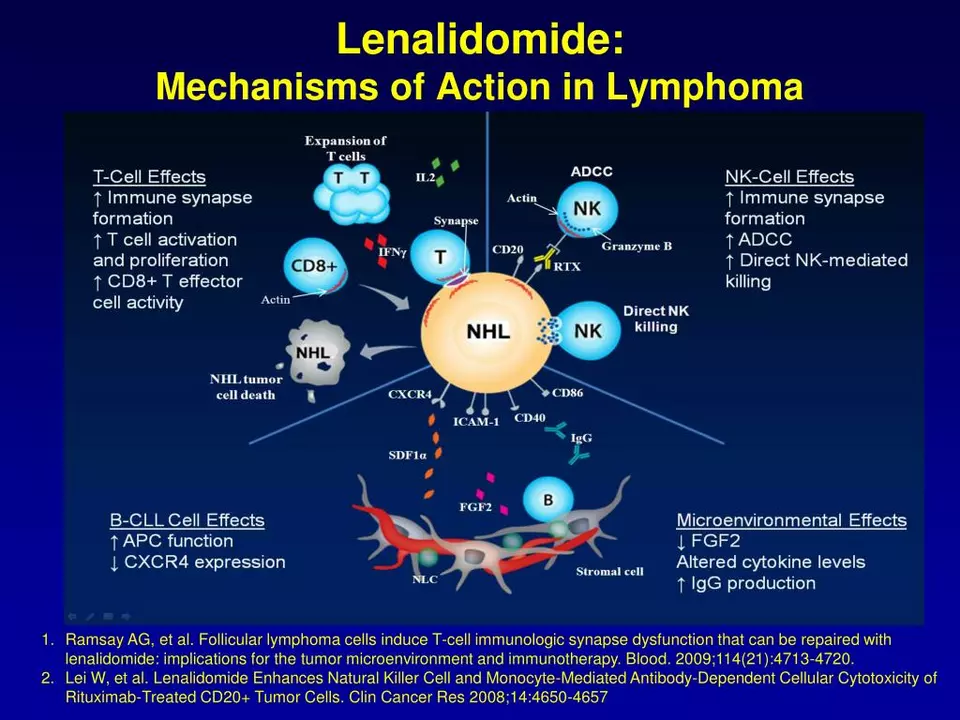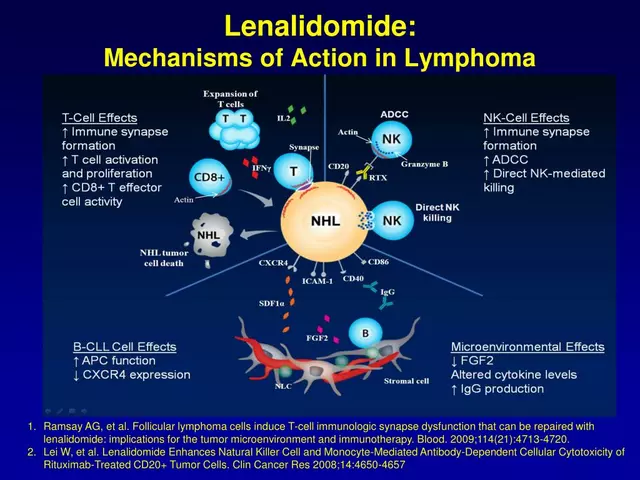The role of lenalidomide in the treatment of POEMS syndrome

Introduction to POEMS Syndrome and Lenalidomide
POEMS syndrome is a rare blood disorder characterized by the presence of certain signs and symptoms, including polyneuropathy, organomegaly, endocrinopathy, monoclonal gammopathy, and skin changes. Treatment options for POEMS syndrome are limited, and patients often face a poor prognosis. However, recent advances have shown that lenalidomide, an immunomodulatory drug, can play a significant role in the management of this disease. In this article, we will explore the potential benefits of lenalidomide in the treatment of POEMS syndrome and discuss the latest research findings in this area.
Understanding the Pathophysiology of POEMS Syndrome
The exact cause of POEMS syndrome remains unknown, but it is believed to involve an overproduction of certain proteins, such as vascular endothelial growth factor (VEGF), which can lead to various symptoms associated with the disease. The overproduction of these proteins is thought to result from an underlying plasma cell disorder, such as multiple myeloma or Castleman's disease. By understanding the pathophysiology of POEMS syndrome, researchers have been able to identify potential therapeutic targets, including lenalidomide, to help manage the disease more effectively.
The Mechanism of Action of Lenalidomide
Lenalidomide is a derivative of thalidomide, a drug that was initially used to treat multiple myeloma but was later found to be effective in treating various other conditions. The exact mechanism of action of lenalidomide in the treatment of POEMS syndrome is not entirely understood. However, it is believed to have multiple effects, including immunomodulatory, anti-inflammatory, and anti-angiogenic properties. These actions help to reduce the overproduction of proteins associated with POEMS syndrome, such as VEGF, and improve the clinical symptoms of the disease.
Lenalidomide as a Treatment Option for POEMS Syndrome
Several studies have been conducted to evaluate the efficacy and safety of lenalidomide in the treatment of POEMS syndrome. These studies have shown promising results, with many patients experiencing significant improvements in their symptoms and overall quality of life. In some cases, patients have even achieved complete remission of the disease. While more research is needed to fully understand the long-term effects of lenalidomide in the treatment of POEMS syndrome, the current evidence suggests that it may be a valuable addition to the therapeutic arsenal for managing this rare and debilitating disease.
Combination Therapy: Lenalidomide and Dexamethasone
In some cases, lenalidomide has been used in combination with dexamethasone, a corticosteroid, to enhance its effectiveness in the treatment of POEMS syndrome. This combination therapy is thought to work synergistically to better control the overproduction of proteins associated with the disease and improve clinical outcomes for patients. Several studies have been conducted to evaluate the efficacy and safety of this combination therapy, with promising results. However, more research is needed to determine the optimal dosing and duration of treatment for patients with POEMS syndrome.
The Side Effects and Safety of Lenalidomide
As with any medication, lenalidomide can cause side effects, and its safety profile should be carefully considered before initiating treatment. Some of the most common side effects of lenalidomide include fatigue, nausea, diarrhea, and an increased risk of infections. More serious side effects, such as blood clots, liver toxicity, and an increased risk of secondary cancers, have also been reported. It is essential for patients and healthcare providers to weigh the potential benefits of lenalidomide against these risks when deciding whether to pursue this treatment option for POEMS syndrome.
Monitoring and Follow-up During Lenalidomide Treatment
Patients receiving lenalidomide for the treatment of POEMS syndrome should be closely monitored throughout the course of therapy to ensure its efficacy and safety. Regular blood tests, imaging studies, and clinical assessments are essential to track disease progression and evaluate the patient's response to treatment. Additionally, healthcare providers should be vigilant for signs of potential side effects and adjust the treatment plan accordingly to minimize risks and optimize outcomes for the patient.
Conclusion: The Future of Lenalidomide in POEMS Syndrome Treatment
In conclusion, lenalidomide offers a promising treatment option for patients with POEMS syndrome, with several studies demonstrating its efficacy and safety in this patient population. While more research is needed to fully understand its mechanism of action and optimal treatment strategies, the current evidence suggests that lenalidomide may play a significant role in the management of this rare and debilitating disease. As our understanding of POEMS syndrome and its underlying pathophysiology continues to grow, it is hoped that lenalidomide and other targeted therapies will pave the way for more effective and personalized treatment options for patients affected by this condition.









Lenalidomide is actually a game‑changer for POEMS patients, and we need to shout about its successes! The data show dramatic symptom relief in many cases, which is exactly the kind of progress we crave. Don't let anyone dampen the excitement; the drug's immunomodulatory punch is real. We should push for wider access and more trials to cement its place. Yes, there are side‑effects, but the benefits outweigh the risks for most. Keep the momentum going!
It's encouraging to see the community rallying behind lenalidomide, especially when the evidence highlights both efficacy and safety. From a clinical perspective, the drug's multi‑targeted approach aligns well with POEMS pathophysiology. Monitoring protocols, however, remain essential to catch adverse events early. I appreciate the optimistic tone, but a balanced view helps us guide patients responsibly.
When evaluating the role of lenalidomide in POEMS syndrome, one must first acknowledge the complexity of the disease's underlying mechanisms, which involve not only VEGF overproduction but also a cascade of cytokine dysregulation. The drug, as a derivative of thalidomide, inherits anti‑angiogenic properties while offering a more favorable toxicity profile, a fact that has been corroborated by several phase‑II studies. Moreover, its immunomodulatory effects extend to T‑cell activation and NK‑cell enhancement, thereby addressing the plasma cell dyscrasia at its root. Clinical investigators have reported that patients experience a reduction in neuropathic pain, improved motor function, and, in some instances, partial remission of organomegaly. Side‑effects such as cytopenias and thromboembolic events, while notable, can be mitigated with dose adjustments and prophylactic anticoagulation. The combination with dexamethasone further amplifies therapeutic outcomes, as corticosteroids suppress inflammatory mediators that may otherwise compromise lenalidomide's efficacy. It is also worth mentioning that regular monitoring through serum VEGF levels provides a quantitative marker to gauge treatment response. In practice, a multidisciplinary approach, involving hematologists, neurologists, and rehabilitation specialists, ensures comprehensive care. Patient adherence, on the other hand, can be challenged by oral administration schedules, prompting the need for clear counseling. From a pharmacoeconomic standpoint, lenalidomide's cost remains a barrier in many healthcare systems, yet its potential to reduce long‑term disability costs presents an argument for broader reimbursement. Future research should aim to elucidate the optimal duration of therapy, as well as the long‑term implications of sustained VEGF suppression. The emerging data on quality‑of‑life improvements, captured through validated scales, reinforce the drug's value beyond mere hematologic parameters. In sum, lenalidomide stands out as a versatile agent that addresses both the hematologic and neurologic facets of POEMS. As we continue to refine dosing strategies, the therapeutic landscape looks increasingly promising :)
One must not be deceived by the superficial allure of a so‑called "miracle drug"; the very notion that lenalidomide can single‑handedly resolve the intricacies of POEMS syndrome borders on hubris. The academic community, cloaked in its own jargon, often neglects the ethical ramifications of deploying a therapy whose long‑term sequelae remain only partially charted. While some clinicians trumpet its anti‑angiogenic prowess, a discerning scholar observes that such praise eclipses the sobering reality of increased thrombotic risk. Let us, therefore, temper our enthusiasm with a measured critique grounded in rigorous evidence.
Yo, the article does a good job explaining how lenalidomide works, but i think it could use a bit more on the patient side effects. Like, some ppl get really tired or have stomach issues, and that can be a big deal for their daily routine. Also, it would be nice to see more real‑world stories, you know, how folks actually feel after treatment. Anyway, glad to see more research coming out, definitely definatly a step forward.
Life is just a series of mis‑interpreted signals.
Indeed, the discourse surrounding lenalidomide is fraught with hyperbole, caution, and, importantly, a call for balanced scrutiny; while the drug shows promise, it is imperative that we weigh efficacy against potential adverse outcomes, and that we do not succumb to either unbridled optimism or outright dismissal, for the patient’s welfare must remain paramount.
I've been following the latest POEMS trials, and the integration of lenalidomide with dexamethasone seems to push response rates higher than monotherapy alone. It's encouraging to see more data supporting this combo, especially when safety profiles stay acceptable. This could become a new standard of care if larger studies confirm these findings.
Absolutely, the synergy between lenalidomide and dexamethasone is like a well‑orchestrated duet, amplifying each other's strengths while keeping the off‑notes in check; we should champion more collaborative research, because only through bold, innovative designs can we truly unlock the full therapeutic potential for POEMS patients.
Lenalidomide looks promising, but doctors need to keep an eye on blood counts and infection risk while patients are on it.